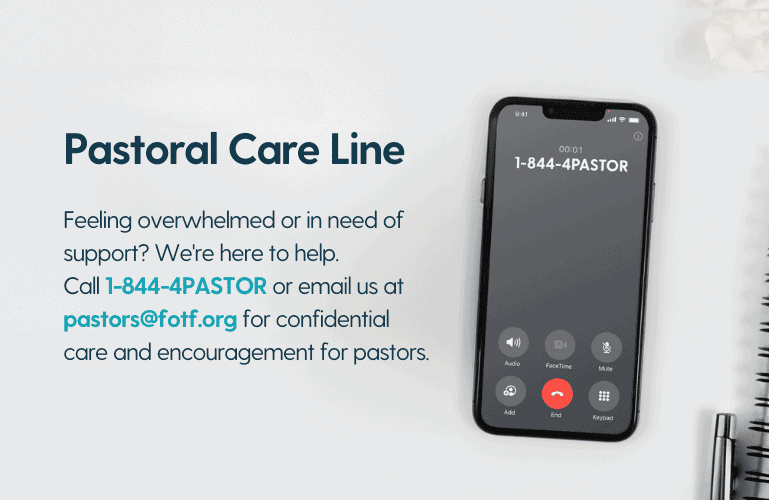Pastoring Those with Doubts
The Bible is full of stories of people who struggle with doubt. Here are just a few examples:
- Abraham was “the man of faith” (Galatians 3:9), but the story of his life in the book of Genesis is riddled with his struggles to believe God’s promises to Him (e.g., Genesis 17:17).
- Similarly, his wife Sarah laughed at the idea that God would give her a child in her old age (Genesis 18:12).
- In the Psalms, Asaph wrestled with the apparent injustice of the prosperity of the wicked and the suffering of the righteous, saying that the issue had almost caused his foot to slip (Psalm 73:2).
- No less a figure than John the Baptist, the greatest of the Old Covenant prophets (Luke 7:28), found his confidence rocked as he sat in Herod’s jail while Jesus healed diseases and preached the good news (Luke 7:18-23).
- The gospels tell us that Peter experienced doubt (Matthew 14:31), that Thomas refused to believe the resurrection reports without tangible proof (John 20:25), and all the disciples doubted one of the initial resurrection appearances of the Lord Jesus (Luke 24:38).
In light of that, it should come as no surprise when pastoral ministry requires us to minister to people who experience doubt. Evangelical churches, however, have not always been the most helpful and welcoming places for people who wrestle with uncertainty and questions. Because our congregations rightly reflect the New Testament’s emphasis on faith as the instrument by which we lay hold of Christ’s righteousness (Ephesians 2:8), and because doubt seems to be the negation of the confidence and assurance that are at the heart of faith (Hebrews 11:1), those who struggle with doubt sometimes find themselves treated as if they were dangerous to the church or on the verge of disqualifying themselves from the faith.
But the pastor’s call is to pursue, care for, and (if possible) restore wounded or wandering sheep. Our job is not to silence or shame those who doubt but prayerfully and diligently help them return to a place where they have firm confidence in the Lord. To that end, let me offer a few observations about doubt and some recommendations for pastors seeking to help those who doubt.
First, doubt can have several different objects. Someone might wrestle with the question of God’s existence. Someone else might firmly believe that God exists but have reservations about whether He is knowable or has revealed Himself infallibly in the Bible. Yet another person might have no questions about the Bible but wonder if God’s gracious promises to his people could apply to someone like them.
Second, doubt can have different causes. There can be many issues or reasons underlying someone’s struggle with uncertainty.
- Doubt can be a form of Satanic temptation or attack. The first doubt recorded in the Bible originated in a diabolic scheme (Genesis 3:1). Satan is a liar who loves to sow confusion in God’s people (II Corinthians 11:3).
- Doubt can also have its roots in intellectual or academic questions. A student may go off to college and be exposed to new ideas and professors hostile to the faith. Or someone may see a series of videos on the Internet that purport to undermine the claims of Christianity. In that case, their doubts are growing in the soil of false ideas and arguments.
- Some doubts find their source in moral issues. People who embrace secret sin often find that God withdraws a sense of his presence in response (cf. Psalm 51:11), which, if not remedied, can create misgivings and uncertainty. Similarly, some people embrace doubt about God’s existence because they want to be free to live in any way they would like. If God doesn’t exist (or His word isn’t reliable), they feel liberated from the obligation to do what He says. This kind of doubt is motivated by sinful desire.
- Other people experience doubts because they have been poorly taught. Some believers were raised or converted in unhealthy environments, where legalism, false doctrine, extreme emotionalism, or abuse was the norm. In this case, someone’s doubt may be a good thing! They should doubt the lies they’ve been taught.
You can see that there’s no “one size fits all” answer to the issue of doubt; shepherds must try to understand skillfully and carefully what lies beneath the struggles of the doubting sheep in their care. We can do a couple of things as pastors to help people wrestling with doubt.
First, we can talk about doubt and acknowledge it as an almost universal experience for Christians. I don’t know any follower of Christ who hasn’t wrestled with some questions about their faith at some point. By acknowledging that doubt sometimes plagues believers, we can make it easier for people to talk about their struggles and thus get the help they need. If we make it seem like doubt is some version of the unforgivable sin, people will be slow to admit what is going on in their hearts.
Second, we can address reasons for faith and barriers to belief in our public teaching. The Christian faith is not based on a fairy-tale or wishful thinking – its roots lie in real, historical events, and there is quite a bit of evidence that the Bible’s witness to those events is true. The apostles weren’t shy about holding forth their credentials as witnesses and reliable guides (e.g., Acts 26:12-23, John 21:24, I John 1:1-3), and there are good reasons to believe that Jesus is the Christ (John 20:30-31). Knowing that people struggle with doubt, pastors should be quick to point them to such evidence. A wise pastor will also work to see how the broader culture in which his people live will make certain aspects of our faith seem less plausible. By regularly addressing the ungodly assumptions, beliefs, and attitudes surrounding our people, we can help them avoid being like the fish unaware of the water in which it swims.
Third, we can maintain the Biblical tension when we address doubt. The letter of Jude reminds us to “have mercy on those who doubt” (Jude 22), and we should undoubtedly address doubt with patience, mercy, and compassion. We want to be like our Savior, who did not break the bruised reed or quench the smoldering wick (Matthew 12:20). But we also want to take seriously the warning found in the book of James, to the effect that doubt comes with the danger of great spiritual instability (James 1:6-8). Doubt can be corrosive and contagious, so we should not coddle or encourage it. If someone wrestles with doubt, we should meet them with compassion and kindness, but we should also discourage them from remaining in that state indefinitely.
Finally, pastors should clarify that it’s the object of our faith that saves us, not the quality of our faith. While it is true that we are saved through faith, it is not our faith that saves us. The Lord Jesus—crucified for our sin and risen from the dead in victory—is the only hope for sinners and the only way we are saved. Our hope of eternal life does not rest in our ability to maintain enough faith of a high enough quality that we can merit salvation. Instead, our hope is in Christ, and our faith (however weak and fragile) is in Him alone. A pastor’s job is to patiently point doubting people to Him.
©2023 Michael McKinley. All rights reserved. Used with permission.
About The Author

Michael McKinley
Mike McKinley is the Lead Pastor at Sterling Park Baptist Church, near Washington, DC. In addition to his pastoral duties, Miked has authored roughly a dozen books.









